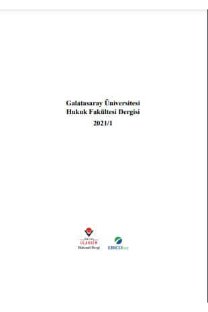THE POSSIBILITY OF LEGITIMACY WITHOUT MORALITY
The concept of legitimacy with its distinguishable components is an inherently elusive concept; it might be descriptive, quasi-normative and normative. This article takes the view that neither descriptive nor quasi-normative forms of legitimacy can be appealed in parliamentary decisions that are of moral significance, for they do not specify any moral or normative criteria for legal norms to be labelled as legitimate. The concept of consensus on the basic values of the society, which has been deployed by contractualist scholars as a normative standard, cannot fully describe the concept of legitimacy for the reason that the element of morality is disentangled from the concept of consensus. Having discussed the three forms of legitimacy at the context of the theories of the prominent scholars, the aim of this article is to reflect on the connection between morality-legitimacy
AHLAKA DAYANMAYAN MEŞRUİYETİN İMKANI
Ayırt edilebilir bileşenleri ile meşruiyet kavramı özü itibariyle tarifi zor bir kavram. Kavram, tasviri (descriptive), yarı normatif (quasi-normative) ve normatif biçimde karşımıza çıkabilir fakat meşruiyetin hem tasviri formu hem de yarı normatif formu ahlaki öneme sahip parlamento kararlarında kullanılamaz. Çünkü meşruiyetin bu yorumları, hukuk normlarının meşru olabilmesi için herhangi bir ahlaki ve normatif kriter sunmaz. Sözleşmeci düşünürlerin normatif bir kriter olarak sunduğu “toplumun temel değerleri üzerinde uzlaşı” kavramı da ahlak kavramından soyutlanmış olması dolayısıyla meşruiyeti olması gerektiği gibi tarif edemez. Bu makale ile meşruiyetin üç farklı formu önde gelen düşünürlerin teorileri çerçevesinde tartışıldıktan sonra meşruiyet-ahlak birlikteliği üzerinde durulacaktır.
___
BARNARD F M, Democratic Legitimacy: Plural Values and Political Power, McGill-Queen’s University Press, Montreal, Ithaca, 2001BEETHAM D, “In Defence of Legitimacy” Political Studies, XLI, 1993, 488
BEETHAM D, The Legitimation of Power, Palgrave Macmillan, Basingstoke, 2nd Ed, 2013
BOTTOMS A, TANKEBE J, “Beyond Procedural Justice: A Dialogic Approach to Legitimacy in Criminal Justice”, The Journal of Criminal Law and Criminology, 102(1) ,2012, 119
BROWNSWORD R, GOODWIN M., Law and the Technologies of the TwentyFirst Century: Text and Materials, Cambridge: Cambridge University Press, 2012
BUCHANAN A, “Recognitional Legitimacy”, Philosophy and Public Affairs, 28(1), 1999, 46
COLON-RIOS J. I., Weak Constitutionalism Democratic Legitimacy and the Question of Constituent Power, Routledge, Oxon, 2012
DWORKIN R., “Thirty Years On (Book Review)”, Harvard Law Review, 115(6), 2002, 1655
FALLON R H, “Legitimacy and the Constitution”, Harvard Law Review, 118, 2005, 1787
GERBER T P, MENDELSON S E, “Public Experiences of Police Violence and Corruption in Contemporary Russia: A Case of Predatory Policing?”, Law & Soc’y Rev. 2008, 42
GROARKE P, Dividing the State, Legitimacy, Secession and the Doctrine of Oppression, Ashgate, Aldershot, Hants, 2004
HABERMAS J, “Human Rights and Popular Sovereignty: The Liberal and Republican Versions”, Ratio Juris, 7(1), 1994 1
HINSCH W, “Justice, Legitimacy, and Constitutional Rights”, Critical Rev. of Int’l Soc. & Pol. Phil., 13, 2010
HOUGH and et.al, “Legitimacy, Trust and Compliance: An Empirical Test of Procedural Justice Theory Using the European Social Survey” in
TANKEBE J., LIEBLING A. (Eds.), Legitimacy and Criminal Justice: An International Exploration, Oxford University Press, Oxford, 2014
JACKSON Jonathan, MILANI Jenna, BRADFORD Ben, “Empirical legitimacy and normative compliance with the law” in FARAZMAND Ali (Ed.), Global Encyclopedia of Public Administration, Public Policy, and Governance, Springer, New York, 2017
JEFFERSON A. M., “The Situate Production of Legitimacy: Perspectives from the Global South” in TANKEBE J, LIEBLING A (Eds.), Legitimacy and Criminal Justice: An International Exploration, Oxford University Press, Oxford, 2014
LEUVEN K U, “J. Rawls’s idea of ‘overlapping consensus’ and the complexity of ‘comprehensive doctrines”, Ethical Perspectives, 16(1), 2009
LEYITOY A, Normative Legitimacy and the State, Oxford Handbooks Online, 2016, DOI: 10.1093/oxfordhb/9780199935307.013.131
LORD N, “Establishing Enforcement Legitimacy in the Pursuit of Rule-breaking ‘Global Elites’: The Case of Transnational Corporate Bribery”, Theoretical Criminology,20(3), 2016
Lord SCARMAN, “The Brixton Disorders 10-12” April 1981 (Cmnd. 8427) paras. 1.1 1.7; (reprt. 1986) UNODC, Corruption in Afghanistan Bribery as Reported by Victims, January 2010
MORRIS C W., An Essay on the Modern State, Cambridge University Press, Cambridge, 1998
RAWLS J, “The Idea of Overlapping Consensus”, Collected Papers, 1987, 421
RAWLS J, Political Liberalism, New York: Columbia University Press, 1993
RAWLS J, A Theory of Justice, Cambridge: Harvard University Press, 1999
RAZ J, The Morality of Freedom, Oxford University Press, Oxford: Clarendon Press, 1986
Reference re Secession of Quebec [1998] 2S.C.R. 217, par.67.
RILEY P, Political Legitimacy: A Critical Exposition of Social Contract Theory in Hobbes, Locke, Rousseau, Kant and Hegel, Cambridge, MA Harvard University Press, 1982
RODNEY, S B, Political Legitimacy and the State, Oxford University Press, Oxford: Clarendon Press, 1990
SADURSKI W, “Law’s Legitimacy and ‘Democracy-Plus’”, Oxford Journal of Legal Studies, 26(2), 2006
SADURSKI W, Equality and Legitimacy, Oxford University Press, Oxford, 2008
SANGARY M E, Questions of Legitimacy, 24 July 2017. https://www.opendemocracy.net/north-africa-west-asia/mohanad-el-sangary/ legitimacy-Egypt-Morsi-Sisi-revolution (accessed on 27/06/2019)
SOPER P, “Legal Theory and the Claim of Authority” in EDMUNDSON William Atkins, (Ed.) The Duty to Obey the Law: Selected Philosophical Readings, Rowman & Littlefield, 1999
SPINNER-HALEY J, “Liberalism and Religion: Against Congruence”, Theoretical Inquiries in Law, 9(2), 2008, 553
SUROWIECKI J, The Wisdom of Crowds: Why the Many Are Smarter Than the Few, Abacus, London, 2005
TAMANAHA B Z, A General Jurisprudence of Law and Society, Oxford University Press, Oxford, 2001
TANKEBE J, LIEBLING A, “Legitimacy and Criminal Justice: An Introduction” in TANKEBE J, LIEBLING A, (Eds.), Legitimacy and Criminal justice: An International Exploration, Oxford University Press, Oxford, 2014
WEBER Marx, Economy and Society: An Outline of Interpretative Sociology, Ephraim Fischoff et al. tr, University of California Press, London, 1978
WELLMAN C, “Liberalism, Samaritanism, and Political Legitimacy”, Philosophy and Public Affairs, 25(3), 1996, 211
WITGENS J (Ed.), The Theory and Practice of Legislation: Essays in Legisprudence, Aldershot: Ashgate, 2005
- ISSN: 1303-6556
- Yayın Aralığı: Yılda 2 Sayı
- Başlangıç: 2002
Sayıdaki Diğer Makaleler
KİŞİSEL VERİLERİN İŞLENMESİ BAĞLAMINDA HUKUKA UYGUNLUK SEBEBİ OLARAK VERİ SAHİBİNİN RIZASI
SLOVAJ ZİZEK’İN İNSAN HAKLARI ELEŞTİRİSİ
JURY, JURES, JUSTICE : UN RAPPORT DE L’ITALIE
GENEL KURUL KARARLARININ İPTALİNDE ETKİ TEORİSİ
ARABULUCULUK FAALİYETİ SONUNDA VARILAN ANLAŞMANIN HUKUKİ NİTELİĞİ
